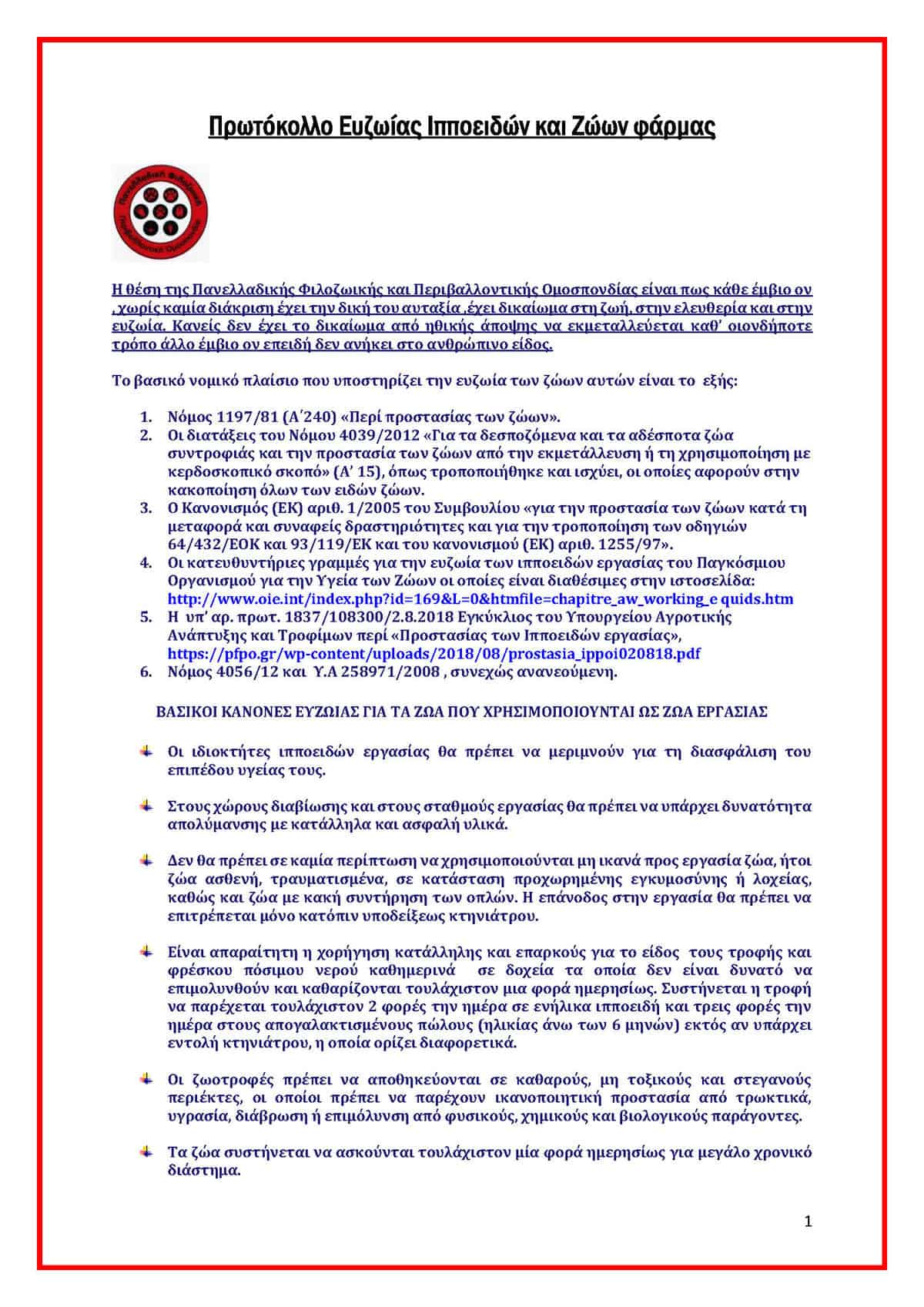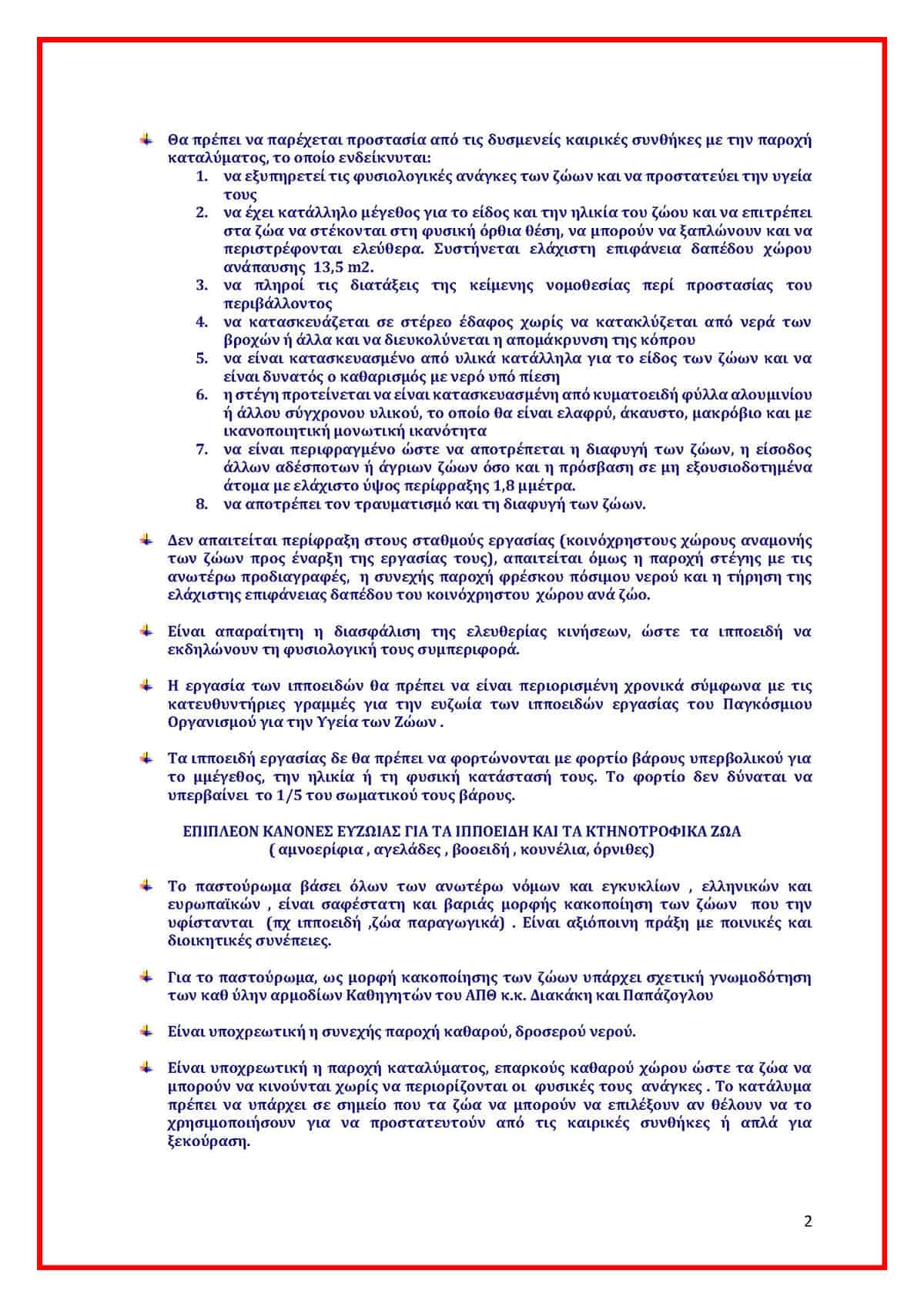
Αγγλική μετάφραση ακολουθεί το Ελληνικό κείμενο.
Η ΠΦΠΟ ετοίμασε και σας παρουσιάζει το Πρωτόκολλο Ευζωίας Ιπποειδών και Ζώων φάρμας
Διαβάστε και κατεβάστε το πατώντας εδώ
ΝΑΞΟΣ
Με την ευκαιρία του διήμερου συνεδρίου στην Νάξο που διοργανώθηκε από την ΠΦΠΟ και τον Δήμο Νάξου με πρωτοβουλία της Εισαγγελίας Πρωτοδικών Νάξου, η ΠΦΠΟ δημιούργησε το πρωτόκολλο ευζωίας των ζώων αυτών, το οποίο βεβαίως βασίζεται στην ελληνική και ευρωπαική νομοθεσία.
Τα συμπεράσματα του συνεδρίου θα καταγραφούν στο Δελτίο Τύπου που θα εκδώσει σύντομα η Ομοσπονδία όπου με κάθε τρόπο η Εισαγγελέας Πρωτοδικών Νάξου τόνισε στην ομιλία της, ότι απαγορεύεται το παστούρωμα των ζώων αλλά και το τοπικό “έθιμο” του ανεβάσματος γαϊδάρου στις ταράτσες των σπιτιών παραμονή της πρωτομαγιάς .
Περισσότερα σύντομα….
ΔΙΑΒΑΣTE,ΕΚΤΥΠΩΣΤΕ, ΜΟΙΡΑΣΤΕ ΤΟ ΠΡΩΤΟΚΟΛΛΟ ΕΥΖΩΙΑΣ
PFPO’s point of view is that all animal species have self-worth, their right to life, freedom and welfare. Animal exploitation is not ethically acceptable.
Basic legal framework on animal welfare follows:
- Law No. 1197/81 (Α’ 240) on animal protection
- Provisions of law No. 4039/2012 “Pets and stray animals protection from exploitation or use for profit” (A’15), which have been amended and concern the abuse of all animal species.
- Council Regulation (EC) No. 1/2005 “Animal welfare during transport and relevant activities and amendment of Directives 64/432/EEC and 93/119/EEC and Regulation (EC) No. 1255/97”.
- Guidelines of World Organization for Animal Health about welfare of working equines are available on website:
http://www.oie.int/index.php?id=169&L=0&htmfile=chapitre_aw_working_e quids.htm
- Circular of Ministry of Rural Development and Food No. 1837/108300/2.8.2018 on welfare of working equines https://pfpo.gr/wp-content/uploads/2018/08/prostasia_ippoi020818.pdf
- Law No. 4056/12 and Ministerial Decree 2589/1/2008, which is updated continuously
BASIC ANIMAL WELFARE RULES FOR WORKING ANIMALS
- Owners of working equines are responsible for their welfare
- Appropriate and safe materials must be used for sterilization in workstations and places where animals live.
- Sick, injured, in late stage of pregnancy or childbirth as well as animals with hooves in bad condition must not be used. Veterinary advice is required in order those animals are able to be used again.
- Appropriate and adequate food and fresh water must be provided on a daily basis. Food and water bowls must be cleaned at least once a day. Adult equines must be fed at least twice a day and weaned foals three times a day, unless there is a different vet’s order.
- Food must be stored in neat, non-toxic and dry containers, which are protected from rodents, humidity, corrosion or contamination by natural, chemical and biological agents.
- Animals must exercise at least once daily over a long period of time.
- In order that animals are protected from extreme weather, accommodation must be provided with the following standards:
- Physiological needs of animals must be met and their health must be under protection.
- Its size must be in relation to the animal’s species and age. Animals must be able to stand up, lay down and freely turn around. The minimum required floor surface for resting is 13,5 m2
- Provisions of existing legislation on environmental protection must be satisfied.
- It must be built on solid ground and not being flooded. Removal of manure must be an easy process.
- It must be built with materials based on animal species and pressure washing must be provided.
- Its roof must be constructed of corrugated sheets of aluminum or other material which should be light, non-combustible, long-lasting and insulating.
- It must be enclosed with a fence of 1.8 meters so animals could not be able to escape, strays or wild animals could not be able to enter as well as not authorized persons.
- It must prevent risk of animals to be injured or escape of animals.
- It is not required that workstations are enclosed. However, lodging is required under the aforementioned standards. Fresh drinking water and the minimum floor area of public space per animal must be provided
- Equines must be able to freely move and express their natural behavior.
- According to guidelines of World Organization for Animal Health on equines welfare, there must be a limited number of working hours.
- Working equines must be loaded in accordance to their size, age or physical condition. The load must not exceed the 1/5 of their weight.
ANOTHER WELFARE RULES FOR EQUINES AND FARM ANIMALS
(lambs, cows, rabbits, chickens)
- According to all aforementioned laws and circulars, Greek and European ones, hobbling is a severe form of animal abuse and it mainly concerns equines and farm animals. It is an offence punishable by criminal and administrative penalties.
- Hobbling constitutes a form of animal abuse according to relevant opinion of Mr. Diakakis and Mr. Papazoglou, both of them professors of Veterinary Medicine at the Aristotle University of Thessaloniki.
- Fresh water should be available at all times.
- Sufficient space must be provided, so animals are able to move freely and satisfy their natural needs. Animals should have the ability to use accommodation in order to be protected against extreme weather conditions or just to get rest.
- Keeping rabbits in cages constitutes violation of animal welfare laws and circulars.
- According to avian influenza, chickens must be kept in an enclosure with fence of 1.8 meters, so animals could not be able to escape, non-authorized persons, strays or wild animals could not be able to enter.
- Animals’ exposure to extreme weather conditions (high or low temperatures, rain and snow) is forbidden.
- It is forbidden to keep animals permanently tied up or under permanent confinement. In other words, any situation that is in contrast to their natural way of life is prohibited by law.
- Pet owner is responsible to take care of his animal and provide veterinary care.
- Animal abandonment is prohibited (Article 27 of law 4235/14).
- Animal abuse, torture and inhuman treatment of all animal species which live on land, air and sea is prohibited.
- Mammals killing in both public and private slaughterhouses is forbidden if instantaneous stunning does not occur before bloodletting (law No. 1197/81).
- Animal breeders and retailers must be licensed.
- Unlicensed vehicles and without legal requirements are forbidden to be used to transport animals.
- Violation of the above rules is related to animal abuse, torture and suspected cause of death. Offenders are prosecuted and significant administrative fines are imposed.
In case the animal has been taken to another place than this mentioned in the complaint, pet owner is responsible to indicate the point to police officers in order to control if animal welfare conditions are met. Otherwise, pet owner is prosecuted for abandonment (law No. 4235/14, Article 27).
PANHELLENIC ANIMAL WELFARE AND ENVIRONMENTAL FEDERATION


